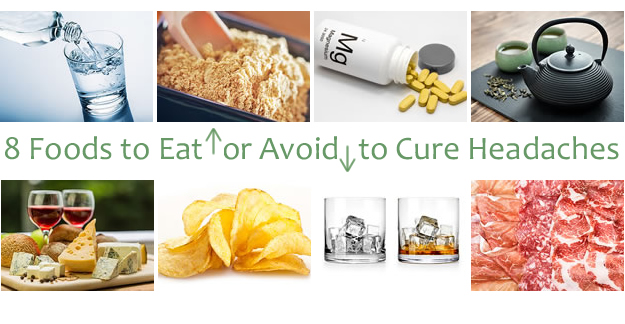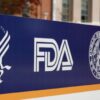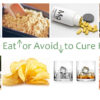Skip the pain meds and try one of these foods to cure a headache or migraine.
A headache can disrupt your entire day, interfering with work, family and fun — so it’s no wonder most of us respond to crushing headaches with a couple of Tylenol or another over the counter med. Nothing wrong with making quick work of the pain, but if you’re inclined to avoid pills some or most of the time, take heart — and take to your kitchen. Your kitchen boasts an arsenal of foods to cure headache. Nutritionists appreciate the potential for these foods to serve as a remedy or a contributor to your pulsating headache or migraine
[metaslider id=11049]
1 Get enough magnesium in foods to cure a headache
“Supplementation of magnesium holds the most promise for treating migraines,” says Lisa Hayim, registered dietitian and founder of The Well Necessities. A recent study found that magnesium deficiency is prevalent in many migraine sufferers. Talk to your doctor or nutritionist about supplement type and dose that’s best for you. (See our blog on buying supplements safely.)
2 Drink plenty of water
Not only may drinking water help ease your headache, dehydration may even be the culprit of headaches. “Although scientists don’t completely understand why dehydration causes headaches, a common theory is that dehydration causes a drop in blood volume that reduces oxygen and blood flow to the brain, resulting in a headache,” say The Nutrition Twins, Lyssie Lakatos, RDN, CDN, CFT and Tammy Lakatos Shames, RDN, CDN, CFT, authors of The Nutrition Twins’ Veggie Cure.
“The good news is that if you do have a dehydration headache, you can get rid of it fairly quickly. According to research, drinking 2 cups of water relieved the symptoms for most people within 30 minutes, while others felt complete relief within 1 to 3 hours after drinking 3 cups of water.” If plain old H2O bores you, try infusing it with berries, sliced oranges, or even fresh herbs like mint to make it more interesting (and make it more likely you’ll keep sipping all day long!)
3 Avoid typical triggers
“Avoid known stimulating foods such as processed foods, MSG, pickled and fermented foods, smoked foods, aged cheese, wine, and dairy if you are prone to headaches or migraines,” advises plant-based dietitian Julieanna Hever, author of The Vegiterranean Diet. “Keep a food journal to document what foods, beverages, or activities can trigger a headache in you so you can have more control.”
4 Decrease your dietary fat intake in foods to cure a headache
“Literature suggests that high levels of blood lipids and free fatty acids are two important triggers causing migraine headaches,” says Hayim. “Under these conditions, platelets aggregate, which is associated with decreased serotonin and increased prostaglandins.” The result of this, she says, is vasodilation, or constriction of blood vessels, which can trigger migraine. “It’s believed that a decrease in dietary fat may decrease headache frequency, intensity, duration, and the need for medication.” Particularly if you suffer from migraines, it may be worth talking to your doctor and working with a nutritionist to see if a dietary change helps.
5 Try powdered ginger
It may sound a little out there, but for migraine sufferers, research on ginger is promising: “Powdered ginger can alleviate headaches without side effects. Just a small dose of powdered ginger has been found to have the same benefit on migraines as a leading migraine medication but without any negative side effects and for a fraction of the cost,” notes Hever. You can get powdered ginger in a capsule or as a dried, ground spice at any health food store.
6 Slash alcohol intake
“Not only does alcohol contribute to dehydration, but sulfites that are used as a preservative in alcohol can trigger a headache,” say The Nutrition Twins. Limiting alcohol can have a pivotal impact in lowering the frequency and intensity of headaches, so start by keeping intake to two drinks per day. Keep a headache log to track when and how intensely your headaches strike to see if limiting alcohol consumption plays a mediating role in your headaches.
7 Sip some tea
Turns out, tea may help ease tension headaches. “Green, black and oolong tea contain the amino acid theanine, which brings on a mental calmness and alertness, helping your mind to problem-solve while also relaxing,” say The Nutrition Twins. “Research has even found that green tea fights anxiety and theanine may reduce the body’s stress responses, including tension headaches.” Headaches are often caused by tension and stress, so if you’re more relaxed, you’ll have less tension and fewer headaches.
8 Steer clear of foods containing nitrates
Say goodbye to bacon, sausage and lunch meats, and you may just say goodbye to your headaches: “Nitrates can expand blood vessels in your brain and trigger pain in people who are sensitive to them,” say The Nutrition Twins. Take heart if you’re a bacon-lover; there are nitrate-free (uncured) options on the market.






